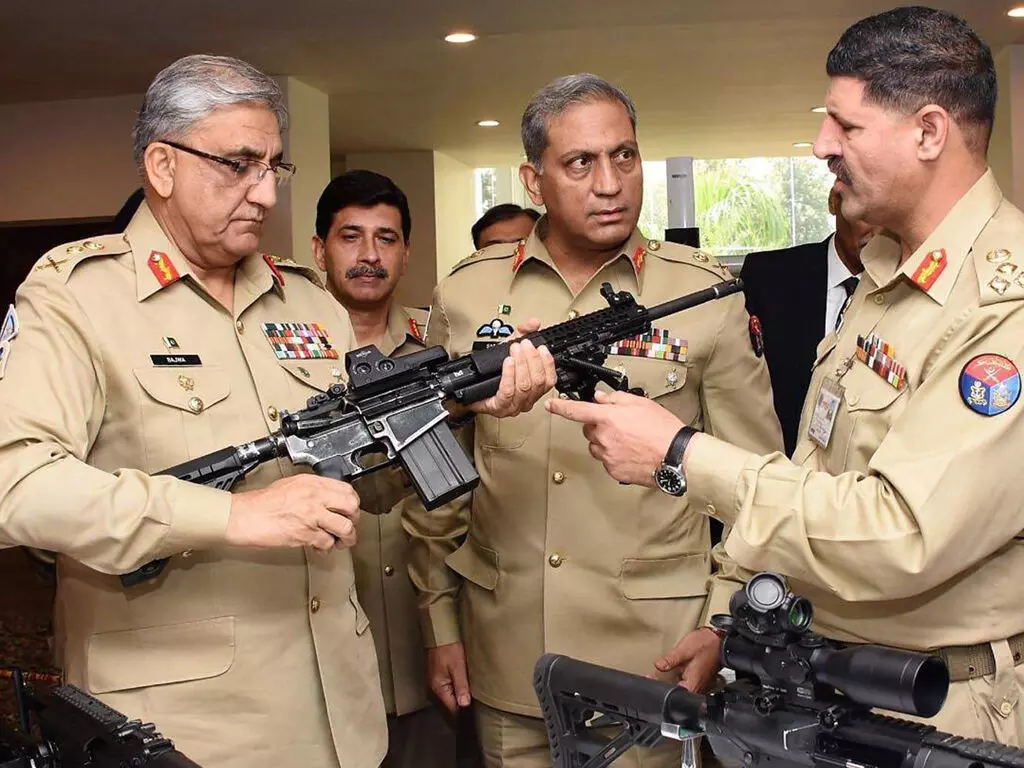Softening stance?
The apparent emergence of advocacy for a genial attitude towards India is a product of Pakistan’s worsening economic and socio-political situation

According to the latest news reports, two journalists from mainstream Pakistani media recently disclosed how the then army chief, General Qamar Javed Bajwa, had discussed the need to revise policy towards India. These two journalists had attended the informal discussions with the chief along with many others about two years ago.
Significantly, both the scribes who were actually present have now denied such crass deviance ascribed to Bajwa. Others have questioned the motive of such delayed revelation with a time-lapse of over two years. Bajwa retired in November 2022, and regardless of the authenticity of what is being alleged, Pakistan's India policy neither changed nor was he able to change it, with more than a year still available to him even if he so intended. That's the bottom line. There can never be a doubt about the Pakistani military's capacity and capability to defend the country against any aggression from any quarter, and no service chief, worth his salt, can ever think of suggesting that his forces aren't war-ready, even if he knows the hard realities himself. That is the general perception and possibly an exaggerated one!
Furthermore, other participants of the same meeting sweepingly denied any such statement by the chief. This discussion came to the fore amid a visit by the Foreign Minister, Bilawal Bhutto, to India to attend the SCO meeting. The disclosure, thus, has a certain background and context. What is intended in this signalling is obvious: the duo or whoever triggered such a debate wished to caution young Bhutto from getting too "adventurous" as he visited India for the first time in his capacity, and not be charmed out of any reason to break out of the straitjacket that has governed Pakistan's India policy for the last seven decades. It literally ties him down to a script, or else as the programme on Bajwa imputed, he and his party could be similarly blighted for selling Kashmir, et al. That's the military screenplay.
Bilawal's grandfather, Zulfikar Ali Bhutto, ended up signing the Shimla Agreement, which reduced Kashmir from a multilateral to a bilateral issue. Can there be greater bankruptcy than bartering collective good for political fortune? It will only perpetuate the status quo. It is a sense of insecurity and untold fear that keeps one from seeking new frontiers. Pakistan and India will remain estranged, beating the odds-on rational coexistence, tied to a policy founded on legacy and anachronism. These are articulated in a section of the media.
It has been revealed that when Bajwa and his team had formally proposed to the Foreign Office to conduct a study on fresh thinking for Pakistan's India policy, the Foreign Minister had invited six former foreign secretaries to assist with the challenge. However, they outrightly rejected the idea. It may be reiterated that India remains Pakistan's most opportune bogey to recertify nationalist credentials. For over seventy years, the military establishment has been criticized for its unifocal obsession with India, and keeping the bogey of India alive is necessary to justify its eminence, which goes into maintaining it.
Only recently, Chief of Army Staff (COAS) General Asim Munir, while addressing the passing out cadets at the Pakistan Military Academy (PMA) in Abbottabad on April 29, asserted that the armed forces were fully capable of defending the country. He also mentioned Pakistan's efforts for peace in the region and with its neighbours (read India), and warned that such efforts should never be taken as a sign of weakness. However, such warnings are repetitive and have been coming from successive chiefs for the last seven decades. More strikingly, the chief mentioned his government's continued support to provide political, moral, and diplomatic support to the Kashmiris. Here, raising the issue of Kashmir vitiates the young military minds, showing the animosity Pakistan still nurtures against India and how a kind of indoctrination is set in from the word go.
Coincidentally, his remarks came in the aftermath of senior journalist Hamid Mir's claim that former Army Chief General Qamar Javed Bajwa, in a meeting with 20-25 journalists in 2021, had stated that the Pakistan Army was not capable of combat. Mir had said that Bajwa believed Pakistan was not in a condition to fight a war with India.
With the economy at its worst, Pakistan is in no position to assert while India has galloped to newer frontiers, economically and politically, knocking for a seat among the world's elites. These are the words of noted Pakistani columnist Shahzad Chaudhry.
In the meantime, elaborating on the new perception, ‘The Express Tribune’ from Pakistan, in its editorial dated April 28, states that this will need talks and parleys at the bilateral and international levels. The Pakistanis are going through their worst economic nightmare since inception, and these require a close and consistent study. Pakistan perhaps needs relief and sustenance, which is affordable. With a vibrant economy next door and commodities at the doorstep in India, Pakistan would do well to repackage and compartmentalise relations with India on a sectoral basis. Territory comes later, and a solution acceptable to all will need to be progressively reached. This, too, will need contact and dialogue. These lines seem important and need to be seriously factored in. Today, Pakistan needs India more than India does Pakistan. In sum, new perceptions in Pakistan towards India are perhaps emerging in certain quarters, requiring a close and consistent study.
The writer is an IPS officer, Adviser NatStrat, security analyst and a former National Security Advisor in Mauritius. Views expressed are personal



